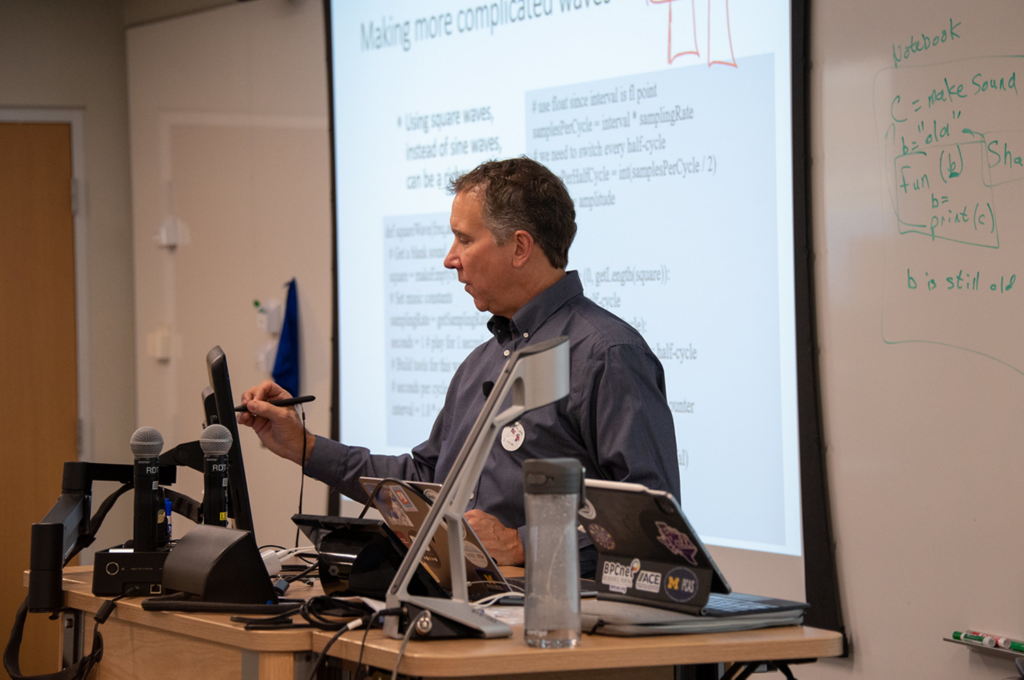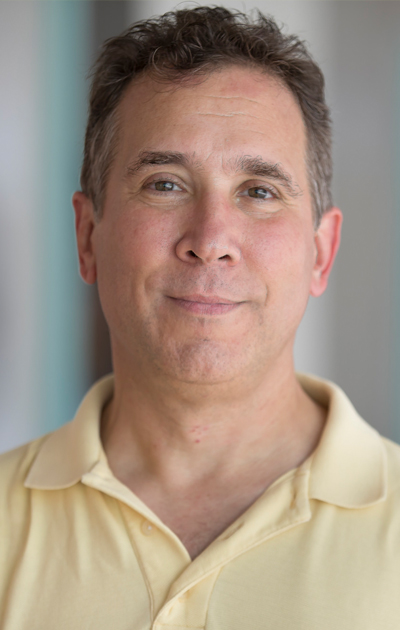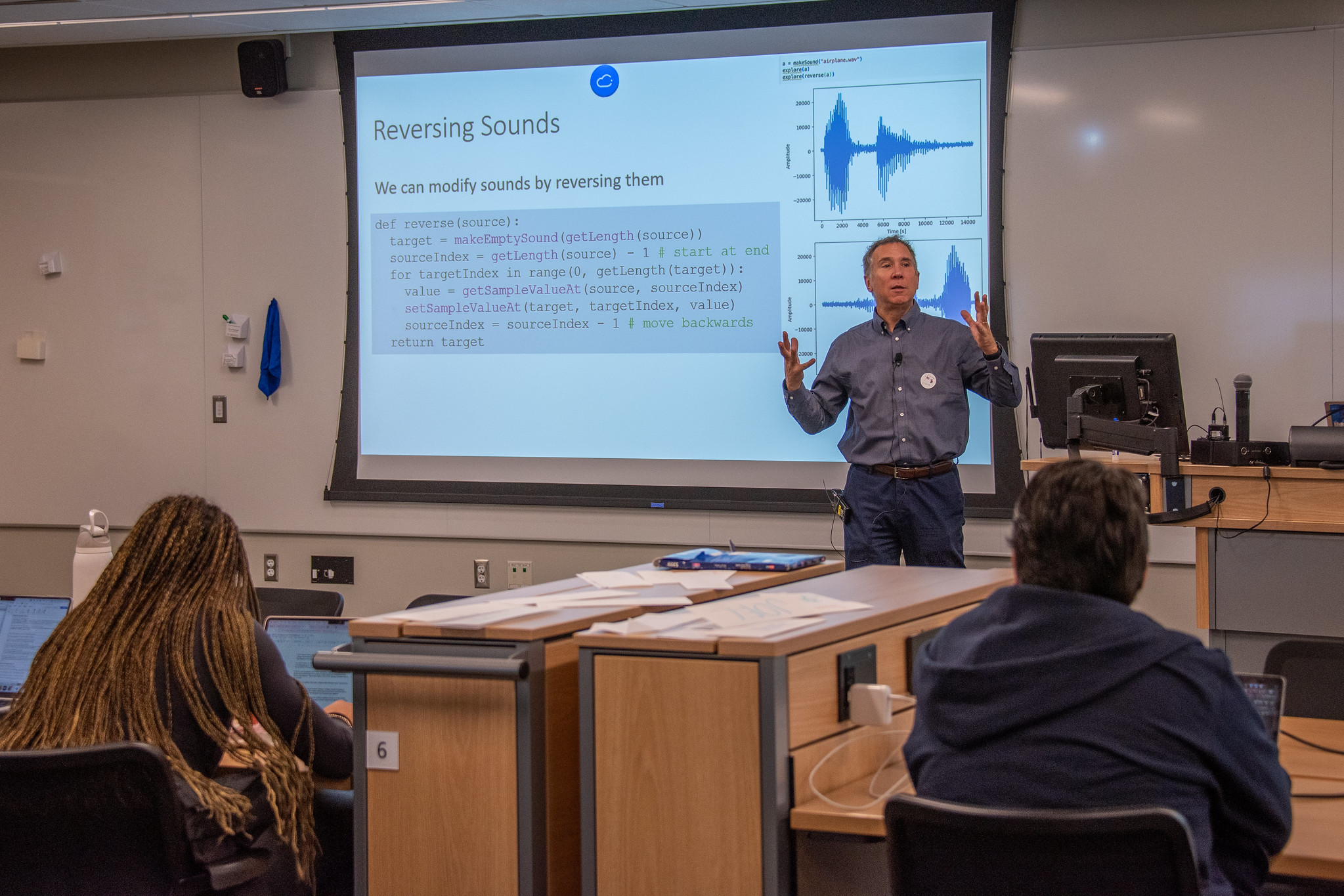Computing across disciplines

Emma Moss never imagined she would be coding as part of her psychology studies. When she first came to University of Michigan, she had limited programming experience and didn’t think of it as a skill that would be relevant to her.

“I thought that programming was reserved for computer science majors and engineering students,” said Moss. “Nowadays though, these skills are becoming essential across majors and disciplines.”
In today’s rapidly evolving world, digital literacy has become more important than ever, even in fields traditionally distant from technology. From the social sciences and humanities to the natural sciences, computing skills are increasingly crucial for problem-solving, creativity, and effective communication. This transformation is becoming a reality at the University of Michigan, thanks to the pioneering Program in Computing for the Arts and Sciences (PCAS).
Launched in 2022 by a dedicated task force of researchers, educators, and administrators, PCAS has grown from a lofty idea to a full-fledged curriculum, making computing and coding skills accessible to students in a broad range of majors, from data science to dance.
PCAS is currently directed by Mark Guzdial, professor of computer science and engineering, who has long been a trailblazer in the field of computing education. The program aims to demystify computing and make it available to all students, no matter their field of study.
“Computing isn’t just for computer scientists anymore,” said Guzdial. “It’s a fundamental skill that provides a powerful new way to explore data and ideas, and enhances creative thinking across the board.”
When Moss first heard about PCAS, she was intrigued but skeptical. “I didn’t see how coding would fit into my psychology studies,” she shared. “But the way PCAS integrates computing with various disciplines made me realize its relevance and potential for enhancing my career and creative projects.”
Fast forward to her senior year, and Moss is now the first student on track to graduate with the Computing for Expression minor, combining her passion for psychology with her newfound programming skills. Her journey is a testament to how PCAS is transforming education by integrating computing into the humanities and sciences.
Computing as a universal skill
In the modern era, computing has become indispensable, touching nearly all aspects of our lives. The ability to code and understand computational systems is a valuable skill across diverse fields, from anthropology to the arts. Recognizing this trend, PCAS is breaking new ground by making these skills accessible to all students, regardless of their major.
“Just as writing is a fundamental skill for articulating ideas and communicating effectively, computing is becoming essential for analyzing problems and creating innovative solutions,” said Guzdial. “Whether you’re conducting a psychological study, composing music, or analyzing historical texts, computing skills can hugely enhance your work.”
Computers and technology are pervasive in the modern world, and the ability to navigate and utilize these tools effectively is increasingly seen as a basic form of literacy. By integrating computing education across disciplines, PCAS ensures that students are not just passive users of technology but active creators who can leverage computational tools to advance their fields.
Moss expressed how helpful this knowledge has been for her own academic career. “Learning to code has opened up new ways for me to approach my studies and be creative,” she said. “These skills are incredibly valuable, no matter what field you’re in.”

The birth of PCAS
Guzdial has been at the forefront of integrating computing into liberal arts curricula for decades. His journey began while a faculty member at Georgia Tech, where he developed a media computation curriculum that made programming accessible to liberal arts and design students. This innovative curriculum transformed how non-technical students engaged with computing, by using contexts relevant to their fields of interest, such as digital media and creative arts.
After 25 years at Georgia Tech, he returned to his alma mater, the University of Michigan, seeking to bring his visionary approach to revolutionize how computing is taught to students in non-technical disciplines.
In 2020, during the height of the pandemic, LSA Dean Anne Curzan and Associate Dean of Undergraduate Education Tim McKay approached Guzdial and Gus Evrard, Arthur W. and Alice R. Burks Collegiate Professor of Physics and associate director of PCAS, with the idea of a new program that bridges computing and the liberal arts. From this initial meeting, the Computing Education Task Force was formed, co-chaired by Guzdial and Evrard and composed of a team of educators at U-M.
The task force interviewed and surveyed dozens of LSA faculty, and scoured course descriptions and syllabi. The goal was to understand how scholars in LSA used computing and to design a curriculum that supported their goals. From this survey, the task force saw that computing in LSA centered around three key themes: computing for discovery, computing for expression, and computing for justice.
“The idea was to tailor computing education to the unique needs of the disciplines in LSA,” said Guzdial. “We wanted to make sure that computing skills were accessible and relevant to all LSA majors.”
The work of the task force ultimately resulted in the publication of a comprehensive report in early 2022 that outlined the unique needs of LSA students in computing education. The findings of this report laid the foundation for the creation of PCAS, which officially began offering courses in Fall 2022.
A basis in research
In addition to responding directly to the needs and feedback of faculty in LSA, the PCAS curriculum is informed by the latest research in computing education, to which Guzdial himself is an influential contributor. His work has consistently focused on making computing education more inclusive and effective, especially for students who might not traditionally see themselves as “tech people.”
Guzdial’s innovative approaches have significantly advanced the field of computing education by demonstrating the importance of contextualized learning. He has shown that when computing is taught using relevant contexts, such as media computation or discipline-specific applications, students are more motivated and better able to understand and remember the material. This approach has helped broaden participation in computing by making it more accessible to a diverse range of students.
“Research has shown that when computing is taught in contexts that are meaningful to students, they are more likely to engage with and retain the material,” said Guzdial. “Our goal with PCAS is to create a learning environment that fosters curiosity and innovation, no matter what a student’s major might be.”
Guzdial’s work has been instrumental in shaping modern computing education, influencing curriculum development and teaching methodologies on a wide basis and paving the way for programs like PCAS.
PCAS today
PCAS has grown exponentially since its inception, with enrollment in the program’s arsenal of COMPFOR classes increasing eight-fold since its first semester. From just 25 students in Fall 2022, PCAS courses now serve over 400 students from various majors, including psychology, economics, and even dance, as well as computer science and data science. The program’s innovative curriculum has attracted a diverse group of students, many of whom have no prior programming experience.
PCAS’s robust set of courses are designed to help students develop computing skills that are relevant to their majors and future careers. Each course is crafted to ensure students are comfortable with programming, can communicate effectively with developers, and are equipped to create technology that promotes social goals.
One course on offer in Fall 2024 is COMPFOR 101 – The Transistor Disruption: How a Tiny Tool Transforms Society and Science, taught by Evrard. Cross-listed with the LSA Honors Program, this introductory course covers the history and societal impact of the field-effect transistor, a crucial 21st-century tool. Students learn how the simple ideas behind transistors make computers work, the transformative power of Moore’s Law, and potential future developments in digital technology. Highlights of the class include a visit to CSE’s exhibit of the ENIAC, one of the world’s first general-purpose computing systems built in 1946, as well as a tour of the U-M Lurie Nanofabrication Facility (LNF), where students can see the state-of-the-art tools and technologies used in semiconductor fabrication firsthand.

Also this fall, Guzdial is teaching COMPFOR 221 – Digital Media with Python, in which students explore how text, images, sounds, and videos are encoded in digital forms by writing programs in Python that create and manipulate these media. They learn foundational programming concepts such as loops, conditionals, and data structures, applying these skills to develop creative projects like image filters and sound synthesis. This course is particularly popular for its practical approach to teaching technical skills through engaging and creative assignments, bridging the gap between technical know-how and artistic expression.
Courses such as these are designed to resonate with students’ interests, incorporating hands-on projects that are approachable and engaging. The participatory design process, involving faculty from various disciplines, ensures the curriculum meets the specific needs and interests of LSA students.
“We’re seeing students from all backgrounds excel in these courses,” said Guzdial. “Our goal is to show them that computing can be a powerful tool, not just for technical fields but for artistic and scientific endeavors as well.”
The needs and feedback of LSA faculty remain at the core of the PCAS curriculum. Take, for instance, the creation of the COMPFOR 131 course. When PCAS started, four of LSA’s natural sciences programs had begun teaching Python to their majors. Evrard brought together instructors from these programs to form the Introduction to Python for the Sciences Organizing Team (IPSOT).
This collaborative effort led to the design of COMPFOR 131 – Python Programming for the Sciences, now taught by those same faculty members. This hands-on interactive course introduces students to Python, covering computational analysis, data organization and manipulation, sound coding practices, and the visualization of scientific information. This course exemplifies how PCAS builds its offerings through faculty collaboration, rather than imposing top-down solutions.
“We’re continually evolving, looking for new ways to integrate computing into liberal arts education,” said Guzdial. “We want to equip students with the computational skills they need to thrive in any field.”
In addition to its increasingly robust course offerings, the program launched two minors, first made available in Winter 2024: Computing for Expression and Computing for Scientific Discovery. These minors prepare students to integrate computational skills into their creative and analytical practices, enhancing their ability to both create and customize digital media, and to conduct scientific research using computational methods.
Moss shared her experience with the Computing for Expression minor. “I was initially intimidated by the thought of coding, but PCAS made it approachable and relevant to my studies,” she said. “It’s empowering to know that I can leverage computing to enhance both my career and creative projects.”
Looking to the future
PCAS continues to thrive by adapting its curriculum to the ever-evolving technological landscape and the diverse educational needs of its students. Guzdial and his team plan to introduce a new minor focusing on the theme area of justice, collaborating with faculty from Philosophy, the School of Information, and other departments to explore how computing can be used to promote equity and social good. There are also discussions about developing an artificial intelligence (AI) minor with the Linguistics Department and the Weinberg Institute for Cognitive Science, emphasizing the dynamics of the human-AI relationship.
“We’re continually evolving, looking for new ways to integrate computing into liberal arts education,” said Guzdial. “We want to equip students with the computational skills they need to thrive in any field.”
Moss’s journey from skeptical psychology student to confident coder is just one example of the transformative impact of PCAS. “The program has opened up a lot of new opportunities for me,” she said. “It’s given me tools that will definitely benefit my future career.”
Thanks to the efforts of Guzdial, Evrard, and all their faculty collaborators, PCAS is setting a new standard for interdisciplinary education. By making computing skills available to all students, PCAS not only enriches their academic experience but also prepares them to navigate and shape the digital landscape of the future.
 MENU
MENU 
